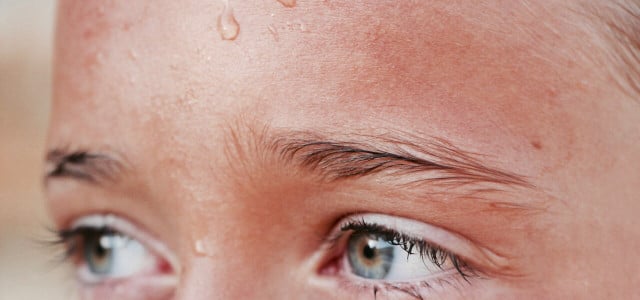
Heat affects the psyche negatively. For example, high temperatures lead to poorer cognitive performance, but also favor different mental illnesses.
Do you often have the feeling that you can concentrate more heavily on particularly hot days and that everything is generally a little more difficult? You are not alone with that!
Different studies show that heat can strongly influence our psyche. In the case of heat waves, our mental performance drops. In addition, the stress load that occurs as a result of the high temperatures, depression and anxiety disorders can cause or exacerbate symptoms.
Heat and psyche: falling cognitive skills
There are now diverse scientific evidence for the connection between heat and psyche. According to Psychology Today, they all come to the same result: high temperatures have a negative impact on cognitive skills.
A study from China from 2024 examined how heat on the ability of subject: inside affected to solve mathematical tasks. The researchers found that the test results were significantly worse at temperatures above 32 degrees Celsius than at temperatures of 22 to 24 degrees.
In addition, the strongest effects in people who were not used to the heat occurred. In the case of people who already lived in warmer areas, however, the heat affected the test results less. They were already better adapted to the high temperatures.
A review from 2019 comes to the conclusion that soldier: Inside, at heat stress in particular, complex cognitive tasks were able to cope with worse. This effect tightened when the participants had to be physically operated in the heat.
According to the AOK, the fact that we are kognitively less efficient in the heat is probably because the body basically consumes more energy at high temperatures. Accordingly, less energy for the brain remains. This occurs particularly when we are exposed to heat during the night and cannot cool down properly in our sleep.
Heat and psyche: depression and anxiety disorders

Extreme heat not only burdens the body, but also represents a serious risk of mental health. “It increasingly stress, sleep disorders and mental previous illnesses,” explains Andrea Benecke, President of the Federal Psychotherapist Chamber (BPTK).
According to the Medical University of Vienna, persistent heat periods can promote depression, anxiety disorders, as well as alcohol and substance consumption. People who already suffer from a mental illness are particularly affected – they often experience a significant aggravation of their symptoms in the heat. According to the German Society for Psychiatry and Psychotherapy, Psychosomatics and Nerve Healing (DGPPN), a higher suicide rate is also associated with increasing average temperatures.
“People with mental illnesses are particularly susceptible to health heating,” emphasizes Prof. Euphrosyne Gouzoulis-Mayfrank, President of the DGPPN. “It is often difficult for people with serious mental illnesses to protect themselves independently and effectively from heat. Mental illnesses are among the most important risk factors for heat -related deaths.”
The environmental doctor Hans-Peter Hutter from the MedUni Vienna therefore warns of taking a closer look at the psychological consequences of the climate crisis. With an increasing number of hot days a year, an increase in mental illnesses and suicides should also be feared.
In addition, heat also affects social behavior: at high temperatures, the potential for aggression increases, which is evident in an increase in violent crime during heat waves. At the same time, heat can also be dampening on the psyche – in the form of a depressed mood or lack of participation.
Depression in summer: cortisol and melatonin

A possible reason for the connection between heat and psyche could be a feeling of climate fear. With increasing heat, people could get a feeling of helplessness, which, according to Hutter, in turn means that the body releases higher amounts of the stress hormone cortisol. This stress hormone favors different physical and psychological complaints over a longer period of time, such as depression.
According to the AOK, however, it could also be a so -called summer depression. This is not directly related to the heat, but with the sleep hormone melatonin. Melatonin is responsible for the sleep-wake rhythm and is released especially in the dark. The body produces less melatonin in summer. This could favor the seasonally dependent depression. However, further scientific studies are necessary in this area in order to better understand the relationships.
Heat and psyche: This is how you can protect yourself
In order to protect itself from mental stress during a heat wave, the Federal Psychotherapist Chamber gives specific recommendations for heat protection:
- Make sure you drink enough. It is best to use water.
- Avoid staying in the blazing sun for too long. So it is best to spend the midday heat in a cooler room or at least in the shade.
- Pay attention to your physical well -being and avoid exhausting physical activities.
- Since alcohol or drug use and intensive sport increase the risk of dehydrating and overheating, you should avoid both on hot days, according to the BPTK. If you don’t want to do without intensive sport, you should do this in cooler and sun -protected places and eat plenty of water.
- Wear wide, breathable and light clothing.
- Take a lukewarm shower or a lukewarm bath to refresh yourself. You can find out why a cold shower is counterproductive here: 7 errors in heat that you shouldn’t do
- Use the oven and stove as economical as possible so as not to increase the temperature in the apartment unnecessarily.
- If you take medication, you should obtain medical advice to clarify what is to be considered in the heat and whether an adjustment of the dosage is required.
For the psyche, too, it is primarily important for heat to avoid overheating. Nevertheless, these tips are of course not a panacea for mental illnesses. Therefore, do not be afraid to seek professional help, such as psychotherapy if you have to do more psychological problems.
These points can also be important for the environment. “It is urgently needed to protect mentally ill people from the consequences of great heat, since they are often unable to do so due to their illness,” said the Berlin Psychotherapist Chamber.
Children are particularly sensitive
The chamber points out that children and adolescents are particularly sensitive to high temperatures, since their body is not yet fully able to regulate heat: they sweat less effectively and dehydrate faster. This increases the risk of heat strokes and circulatory problems. Existing diseases can deteriorate through heat.
This also applies to the regulation of mental states: “Under heat, psychological stress in children. Stimulus and restlessness, concentration problems, sleep disorders, aggressiveness are increasing. Problems such as depressive mood, social withdrawal, emotional vulnerability or impulsive behavior are also increased by heat.”
When is heat dangerous?
If the perceived temperature rises above 30 ° C during the day and does not fall below 20 ° C at night, heat can become a danger. Excessive heat can lead to serious physical reactions and a psychological emergency, a so -called “heat out case”. Then immediate help is required.
With material of the dpa.
Read more on utopia.de:
- What better helps in heat: cold or warm drinks?
- Alcohol in the heat: why this is so dangerous
- Sport in the heat: what works and what is not possible
** marked with ** or orange underlined Links to sources of supply are partially partner links: If you buy here, you will actively support Techzle\.com, because we will then receive a small part of the sales proceeds. More information.